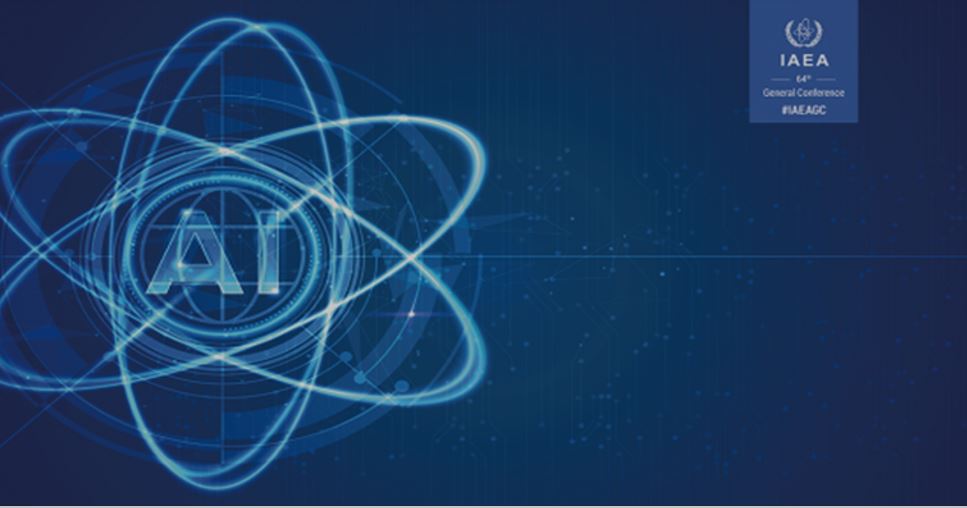Elodie Broussard, IAEA Office of Public Information and Communication, Sep. 23 2020
Held virtually on Sept. 23 2020 at the sidelines of the 64th IAEA General Conference, the first ever IAEA meeting discussing the use of artificial intelligence (AI) for nuclear applications showcased the ways in which AI-based approaches in nuclear science can benefit human health, water resource management and nuclear fusion research. Open to the public, the event launched a global dialogue on the potential of AI for nuclear science and the related implications of its use, including ethics and transparency.
AI refers to a collection of technologies that combine numerical data, process algorithms and continuously increasing computing power to develop systems capable of tracking complex problems in ways similar to human logic and reasoning. AI technologies can analyse large amounts of data to “learn” how to complete a particular task, a technique called machine learning.
“Artificial Intelligence is advancing exponentially,” said Najat Mokhtar, IAEA Deputy Director General and Head of the Department of Nuclear Sciences and Applications. “AI’s ability to recognize data patterns and analyse high-resolution images from satellites, drones or medical scans can improve responses to humanitarian emergencies, help doctors identify cancer and other diseases, increase agricultural productivity, and track animal and marine migrations.”
Applied to nuclear science, AI has the potential to advance cancer staging in nuclear medicine and cancer treatment, to accelerate progress towards the realization of fusion energy production, as well as to help protect global water resources from overexploitation and contamination, and more.
AI for cancer staging and treatment
“Modern oncology, although very advanced, is still largely a one-fit-for-all endeavour,” said Jan Seuntjens, Professor and Medical Physicist at McGill University in Canada. “This means treatment prescribed for patients with a particular disease are still very much generic or, in other words, the same from one patient to the other patient. AI gives us the opportunity to make treatment much more personalized, taking into account all the information or data that we have on that particular patient.”
Seuntjens highlighted the ways AI could support physicians in the diagnosis and treatment of cancer through improved image interpretation, more accurate treatment plans and tumour contouring as well as through adaptive radiotherapy – a radiation therapy process that adapts to internal anatomical variants of the individual patient.
“Support of decision-making by healthcare professionals can be facilitated through AI and machine learning as tools in our health care toolbox,” said May Abdel-Wahab, Director of IAEA’s Division of Human Health.
Advancing fusion research with AI
Nuclear fusion represents an opportunity to achieve abundant, safe and sustainable energy.
For research in this area, which requires substantial experimental and theoretical activity covering plasma physics and material sciences, among other fields, AI-based methods offer opportunities for accelerating progress towards the realization of fusion energy by maximizing the amount and applicability of information extracted from experimental and simulation data.
David Humphreys, Principal Scientist at General Atomics, United States, explained how AI could enable prediction and control solutions necessary for sustained, safe and efficient future fusion power plant operation. Among the AI and machine learning opportunities to advance fusion research, he pointed out optimizing experimental planning to help speed up progress in gaining new knowledge and real-time optimization of plasma control scenarios using algorithms derived from large databases developed at experimental fusion facilities worldwide.
Establishing the first ever IAEA online fusion database, the Agency published this week the Fusion Device Information System (FusDIS), containing data on more than 100 public and private fusion devices worldwide which are currently in operation, under construction, closed or being planned.
Protect water and the environment using AI
How do tap water management practices impact water losses? Do production sites of pacific salmons change every year? What are the sources of moisture to hurricanes? Insights to these questions can be given by large-scale mapping of hydrological and environmental processes with the support of machine learning. This is what demonstrated Clement Bataille, Assistant Professor at the Department of Earth and Environmental Sciences at the University of Ottawa in Canada.
AI can help manage environmental, hydrological and ecological resources in isotope geochemistry. As isotope science uses enormous amounts of data shared in global networks and repositories, including those of the IAEA, using AI is becoming critical to obtain interpretable results and enhance our understanding of environmental and hydrological processes, explained Bataille.
The role of AI ethics in shaping the future
The use of AI also has an ethical component, and this was the focus of the intervention by Emma Ruttkamp-Bloem, Professor at the University of Pretoria, South Africa and chairperson of a UNESCO Ad Hoc Expert Group on the ethics of AI.
The key to a future in which humans live in harmony with each other and with technology is recognising that the impact of the interconnectedness of AI technologies with human lives should be considered on a continuum of social, political, environmental, educational, scientific and economic concerns, she explained.
Rethinking the core elements of education when it comes to AI is essential; the emphasis should not be on coding and digital skills only, but also on computational thinking, Emma Ruttkamp-Bloem added.
Organized to help build a common understanding of the applications and capabilities of AI for nuclear science and applications, the event also helped foster proposals for collaboration. These will be followed up to ensure that all countries can take full advantage of this emerging technology in future, Mokhtar said.
Source: https://www.iaea.org/newscenter/news/the-future-of-atoms-artificial-intelligence-for-nuclear-applications

